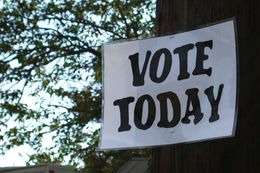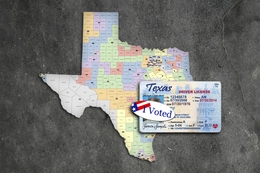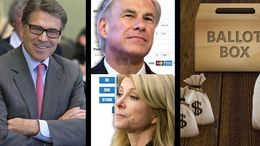
Labor Day weekend kicks off the seasons of Texas’ biggest full-contact sports — politics and football.
To borrow an approach from the football analysts, here’s a trio of “keys to the game” as the calendar counts down to Election Day:
• Rick Perry, the elephant in the room: The state’s longest-serving governor managed to suck the air out of the room twice this summer. The first time, he did so by positioning himself as President Obama's chief critic on the border.
The second time arose with a pair of felony indictments handed up by a Travis County grand jury. Despite the circumstances, Perry was able to come back and rally his political based, at least in the short term, by framing the issue as an attack on his gubernatorial prerogatives and right to free speech.
Each time, Perry commandeered the spotlight just as Wendy Davis, who is trying to return the Governor’s Mansion to the Democrats after 20 years, was managing to build up a head of steam on the campaign trail.
In addition to these two developments, Perry is busy with his pre-presidential campaign positioning. He’s been to New Hampshire and South Carolina in the past week and will be among a roster of White House hopefuls at an Americans for Prosperity event this weekend in Dallas.
All of this blurs the fact that Perry will not be on a statewide ballot for the first time since 1990.
Davis, who is in an uphill struggle to defeat the GOP nominee Greg Abbott, has to hope the spotlight moves away from Perry in order to allow voters to focus on the gubernatorial campaign and on her. But will it?
• It’s all about the turnout: Polling throughout the year has shown Abbott consistently ahead of Davis. To get within hailing distance, the Davis campaign has worked to shake up the dynamic, dropping $4 million in August on ads constructed to drive up Abbott’s negatives, especially among female voters.
A recent analysis showed that one problem facing Texas Democrats is that the demographic shifts here — based on natural increases among U.S.-born minorities and immigration from outside the country — aren’t conducive to a quick political realignment. Texas stands in contrast, according to the analysis, to states like Virginia or Florida, where the populations are being augmented on a proportionately higher basis through migration from already Democratic states in the Northeast or California.
Texas Democrats respond that the analysis doesn’t take into account existing potential Democratic voters — minorities who disproportionately fail to register and turn out.
Groups like Battleground Texas have organized to identify and get these voters to the polls. How successful they are this year is also key to whether Davis does better than recent Democratic gubernatorial nominees.
• October surprises: With the current dynamic favoring an Abbott win, his team has got to be hoping for no surprises in October. But political history shows that unexpected things do happen.
There’s certainly potential for excitement around the debates for governor and lieutenant governor, although all four camps will do everything possible to leave nothing to chance at each encounter.
*****
A couple of resignations have triggered new ballots in a legislative race and a judicial race.
On the South Plains, the decision by Lubbock Republican Charles Perry to seek the state Senate seat vacated by Robert Duncan triggered a vacancy in Perry’s HD-83.
Party officials from both major parties last week chose replacements to appear on the November ballot. Republicans chose a Lubbock attorney, Dustin Burrows, while Democrats chose Max R. Tarbox, son of former state Rep. Elmer Tarbox.
And in Dallas County, Jim Moseley resigned his seat on the 5th Court of Appeals to join the commercial law firm Gray Reed & McGraw.
Rockwall County prosecutor Craig Stoddart was selected to take the Republican spot on the November ballot while the Democrats selected District Judge Ken Molberg.
Perry gave Stoddart a boost this week by giving him the intermediate appointment to the bench until the election, allowing him to run with the (I) for incumbent behind his name.
*****
Here’s the week in endorsements:
• Wayne Faircloth, the GOP candidate for the Galveston-based HD-23, won the endorsement of U.S. Sen. Ted Cruz.
• GOP attorney general candidate Ken Paxton received endorsements from the Dallas Police Association, the Combined Law Enforcement Associations of Texas and the Texas Association of Manufacturers.
• GOP lieutenant governor candidate Dan Patrick got the endorsement of the political arm of the Texas Society of Certified Public Accountants.
• Democratic lieutenant governor candidate Leticia Van de Putte received the endorsement of the political action committee for the Texas Pharmacy Association.
• The Texas Parent PAC endorsed Democratic HD-105 candidate Susan Motley.
• GOP SD-28 candidate Jodey Arrington won the endorsement of Texas Alliance for Life.
• GOP SD-28 candidate Charles Perry got nods from state Rep. James Frank, R-Wichita Falls, and from the Lubbock Avalanche-Journal.









